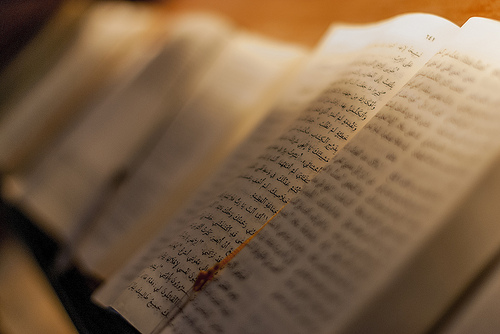Today is my One-Hundredth Blog Post on The Joyful Truth!
I’m kind of amazed.
I’ve loved writing these posts. Exploring ideas and questions, sharing struggles and lessons from my life, and talking about God’s Word.
I don’t know just how to describe how important this Book is to me. The beauty, the love, the intimacy I find in its pages. I’ve loved sharing insights, inspirations, and thoughts from my devotional times with you.
I’ve always believed that it is so very important that we each take the time to get to know this Book. I’ve been so blessed to have been raised by people who were always available to answer my questions and help me become as familiar as I’d like with it. My Mom and Dad always encouraged me to study it for myself, and would introduce me to passages that became like life and breath to me.
Jesus answered, “It is written: ‘Man shall not live on bread alone, but on every word that comes from the mouth of God.'” Matthew 4:4
But I admit, it’s a pretty big book, and if you know nothing about it you might not know where to start in unlocking its beauty.
So what does the newbie need to know?
First you might want a quick break down of its contents. And I don’t mean just that there is an Old and New Testament, but what those Testaments are made up of.
An Outline:
The Old Testament, for instance, is basically Jewish Scripture. This is something you may not know, I’m amazed at times how many don’t realize that Jesus was Jewish and the whole Christian faith has a basis in the Jewish faith.
You can break up the Old Testament into a few basic categories:
Historical
Poetical
And both Major and Minor Prophets.
Historical books include everything from Genesis to Esther. The first five books: Genesis through Deuteronomy, are called the Pentateuch and were (and can still be) required memorization in Jewish tradition.
Job through Song of Songs (or Song of Solomon) are considered Poetical books. The Psalms can be a beautiful place to spend time in worship, remembering how God fights for you.
The Major Prophets run from Isaiah to Daniel, and the Minors from Hosea to Malachi. These books have both biblical history and prophecies. The difference between Major and Minor is basically length. The “minors” aren’t in any way less important.
The New Testament can also be divided into groups:
Historical
Pauline Epistles and General Epistles
And Revelation.
The Historical books include the Gospels and Acts, Matthew to Acts. The Four Gospels are four different telling of Christ and His life, each bringing their own perspective from their own authors. Acts is written by the same author as Luke, and tells the story of the early church.
All Epistles are actually letters. Pauline Epistles are those written by Paul, and the others are simply written by others. The names are based on either the city or person they were written to, or the person who wrote them. For instance Philippians was written to the church in the city of Philippi.
Revelation is the only book of prophecy in the New Testament, though their are prophesies in the gospels themselves. Revelation was written by John, who wrote the book of John.
Where to Start:
If you’ve never studied the Bible before its generally felt to be better to start in the New Testament in one of the Gospels. Jesus is the center of this story and getting to know about His life and teachings will change your life. It’s also thought to be a good idea to start in John. John was one of the twelve apostles and his gospel has a beautiful focus. He refers to himself in the book as “the apostle that Jesus loved” rather than by name.
As you move through scripture, its a good idea to keep a few things in mind, like who wrote a particular book, and who it was written to. Some things need a bit of context and generally a good study Bible will include facts to lay the foundation and give the backdrop. This is one of the reasons, however, that a good church is so important. Having those who have gone before and can help guide you as you read is a great help!
A good reading plan can also help. I highly recommend the YouVersion app. They’ve gathered hundreds of reading plans and translations and can guide you through any amount of selection of books, or even the whole book, in anything from a few months to a year or more. I like trying to read the whole thing once a year, as well as doing more focused studies.
I admit that there are places I tend to land at times. The Psalms can be refreshing when life is hard. Reading the gospels and Christ’s words can also seem like jumping in a pool of grace when things feel dry. Lately I’ve spent a lot of inspired time in Romans. Studying this book is a life long journey.
It’s one big beautiful story, starting from the beginning of time and extending to the end of it. It’s His story, told through His love for us. It’s His love letter to us, His people. It’s His words, His teachings, warnings, guidance, and His very prayers for us.
“My prayer is not for them alone. I pray also for those who will believe in me through their message, that all of them may be one, Father, just as you are in me and I am in you. May they also be in us that the world may believe that you have sent me. I have given them the glory that you gave me, that they may be one as we are one; I in them and you in me- so that they may be brought to complete unity. Then the world will know that you sent me and have loved them even as you have loved me. John 17:20-23
This is a prayer from Christ, the night before He is crucified. And do you know who He is praying for? You and me! “Not for them alone, I pray also for those who will believe in me through their message,” That’s us! Right here is a record of a prayer He made for YOU, two-thousand-years ago. This is His message, not just a message, His message, and its for you, His gift, to you.
~Joy Aletheia Stevens
Photo Credit: by Jesus Solana (CC BY 2.0)
Photo Credit: by Ryk Neethling (CC BY 2.0)
Photo Credit: by Leland Francisco (CC BY 2.0)



Leave a Reply